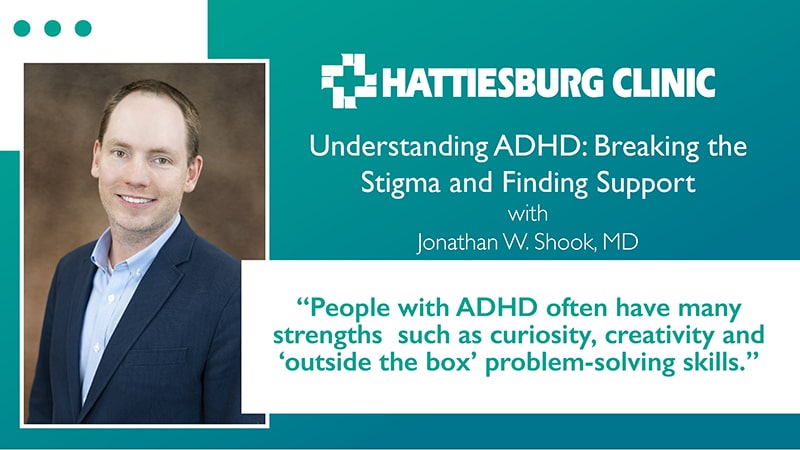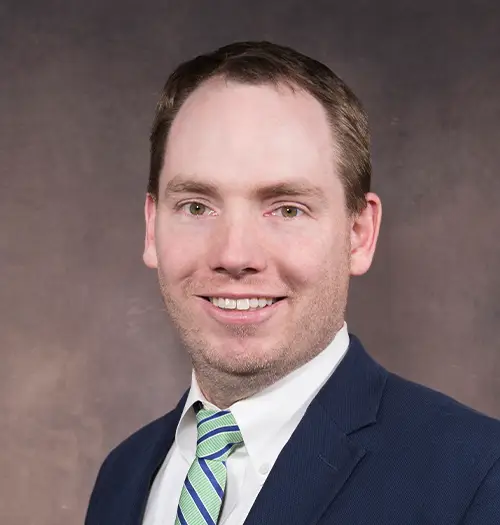Understanding ADHD: Breaking the Stigma and Finding Support
Attention-Deficit Hyperactivity Disorder (ADHD) is one of the most common neurodevelopmental conditions in children and teens. While many children occasionally show signs of restlessness, distraction or impulsivity, those with ADHD experience these behaviors more persistently and in ways that interfere with school, relationships and daily routines.
“There is a lot of misinformation and negative stigma associated with ADHD, but ADHD is a real condition found to be heavily influenced by genetics as well as differences in size and functioning in certain areas of the brain. It is not caused by bad parenting, ‘laziness’ or other negative labels often assigned to children or teens with ADHD,” Jonathan W. Shook, MD, with Hattiesburg Clinic Connections said.
ADHD is a brain-based condition, heavily influenced by genetics, and symptoms usually first appear in childhood. Any child may seem inattentive or restless at times, but individuals with ADHD display a persistent pattern of difficulties with managing attention, emotions and impulses that significantly affect daily life. Research over the last 30 years has revealed that many other symptoms beyond inattention and hyperactivity contribute to the challenges of ADHD. Difficulties in emotional regulation and executive functions such as planning, prioritizing and working memory are just a few examples that can impact children and teens with ADHD.
“Children with ADHD often have remarkable strengths and talents, but their ADHD can be an obstacle that limits reaching their potential in many aspects of their lives,” Dr. Shook said. “Identifying and treating ADHD earlier rather than later has shown to be very important in improving outcomes for those with ADHD.”
Parents and teachers play a powerful role in helping children with ADHD thrive. A diagnosis is made by medical or mental health clinicians through a thorough evaluation, which includes medical and developmental history, family history and detailed feedback from parents, teachers and other adults involved in the child’s life.
Most individuals with ADHD also experience at least one coexisting condition such as a learning disability (most commonly dyslexia), anxiety, depression or autism spectrum disorder. Identifying these coexisting conditions as early as possible is essential so they can be addressed alongside ADHD treatment. Untreated ADHD has been linked to higher risks of undesired outcomes such as school failure, difficulty maintaining employment, challenges in relationships, depression, anxiety and even suicide. Early identification and appropriate treatment, however, can be protective and allow individuals with ADHD to use their strengths more fully across many aspects of life.
Once diagnosed, families can work with their health care team to explore treatment options. Treatment for ADHD usually includes a combination of behavioral interventions, academic accommodations and medication, with the best outcomes often achieved by combining approaches. Parents may also feel overwhelmed after a diagnosis, but professionals encourage families to focus on both the challenges and the unique advantages children with ADHD bring such as creativity, curiosity and problem-solving skills. Recognizing strengths while addressing weaknesses allows children to grow, adapt and thrive with the right support.
Establishing consistent routines creates structure and predictability, while breaking large tasks into smaller steps makes responsibilities more manageable. Clear instructions, realistic expectations and positive reinforcement are key at home and in the classroom. Teachers and parents should also maintain open communication to ensure a child’s needs are being met across environments. Practical strategies such as improving sleep habits, ensuring good nutrition, supporting physical activity and teaching organizational skills can also strengthen daily functioning.
“ADHD can present challenges that are difficult for both kids and families. However, people with ADHD often have many strengths that are often advantages such as curiosity, creativity and ‘outside the box’ problem-solving skills. Recognizing a child’s strengths and areas of weakness while also learning about the best treatment options can allow for growth, progress and thriving,” Shook explained.
To further support families and professionals, Hattiesburg Clinic Connections and Hattiesburg Clinic Psychology & Counseling will host the 22nd Annual ADHD and Related Concerns Conference on Oct. 23 and 24 at Lake Terrace Convention Center in Hattiesburg, Miss. This event will feature speakers and interactive sessions on conditions such as ADHD, autism, dyslexia and addiction. Whether you are a parent, educator or health care provider, the conference will provide valuable resources and practical tools. To learn more or register, visit www.hattiesburgclinic.com/adhd-conference.
###
About Hattiesburg Clinic Connections:
Hattiesburg Clinic Connections serves as a regional resource center for children, adolescents and adults who struggle with learning, attention problems, behavioral concerns or emotional difficulties. The team at Connections uses evidence informed guidelines as well as standard of care practices to help improve the lives of people with conditions such as attention deficit hyperactivity disorder (ADHD), dyslexia, anxiety, depression, oppositional defiant disorder (ODD) and autism spectrum disorder.
Connections works closely with Hattiesburg Clinic Psychology & Counseling, which is located in the same building. Psychologists and counselors work directly with their patients and with the medical management team at Connections to determine a plan that creates positive change.
About Hattiesburg Clinic Psychology & Counseling:
Hattiesburg Clinic Psychology & Counseling offers a broad range of outpatient services, including research-based counseling and comprehensive psychological assessments. Our team of licensed and credentialed professionals collaborates with your medical provider to ensure continuity of care.
Our mission is to provide a caring and respectful environment for individuals of all ages, from preschool through senior adults, and families who are struggling with behavioral or emotional concerns, transitions, decisions or crises.
About Hattiesburg Clinic:
Hattiesburg Clinic is Mississippi’s largest privately-owned, multispecialty clinic. Founded in 1963, Hattiesburg Clinic has expanded to include over 450 physicians and providers, along with 2,500 employees, serving patients across more than 17 counties in Mississippi. Hattiesburg Clinic is committed to being the health care provider of choice in the communities we serve.

